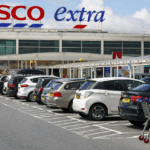UK car manufacturing experienced a dramatic drop in November, with production falling nearly a third compared to the same month last year. New figures from the Society of Motor Manufacturers and Traders (SMMT) revealed that just 64,216 cars were produced in November 2024, marking a 27,711-unit decline from November 2023. This represents the ninth consecutive monthly decline, reaching the lowest output for November since 1980.
Of the cars produced, fewer than a third (19,165) were either battery electric or hybrid vehicles, with the sector recording a sharp 45.5% year-on-year slump. The overall decline in production mirrors the challenges the UK automotive industry faced in the early 1980s, a period marked by industrial unrest and the dominance of Ford models such as the Escort Mk3, Sierra, and Cortina.
The SMMT’s chief executive, Mike Hawes, acknowledged that while some decline was expected due to ongoing transformations at many plants, manufacturers are facing significant pressures both domestically and internationally. “Billions of pounds are being poured into new technologies, models, and production tooling, but the challenges are formidable,” Hawes said.
The data highlights a growing imbalance in demand. Output for the domestic market fell by more than half, while export production shrank by 21.3%. The total car production for the year so far stands at approximately 734,500 vehicles, a reduction of 108,790 compared to the same point in 2023, and only half of the 2019 levels.
The situation has been exacerbated by recent policy decisions. Stellantis, the parent company of Vauxhall, has announced the closure of its van-making plant in Luton, putting up to 1,100 jobs at risk. Stellantis has partly blamed the closure on the UK’s stringent zero-emission vehicle (ZEV) sales targets, which require manufacturers to meet ambitious annual goals or face substantial fines.
Business Secretary Jonathan Reynolds has acknowledged the industry’s concerns and pledged to review the ZEV mandate, with a government response expected in January. The SMMT has called for swift action, emphasizing the need for incentives to stimulate the domestic electric vehicle market, increased investment in charging infrastructure, and a clearer industrial and trade strategy.
The industry body stressed that immediate and decisive action is necessary to secure the future of the UK automotive sector. “Connecting a thriving local market with robust local production is essential for the sector’s revival,” the SMMT said.
As the UK car industry grapples with technological shifts, changing consumer behavior, and ongoing policy uncertainty, November’s figures underscore the turbulence reshaping the sector.









